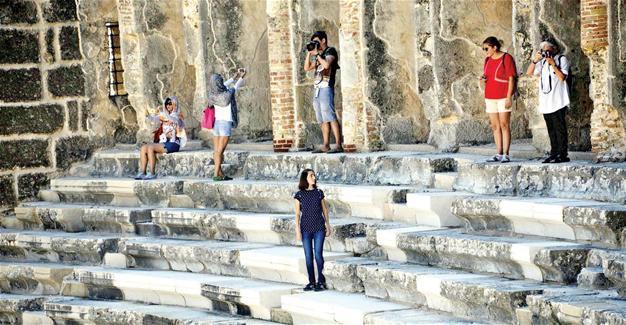Russia lifts ban on some Turkish farm imports
MOSCOW – Reuters

DHA photo
Just a day after Turkey and Russia struck a historic pipeline deal on Oct. 10 to carry natural gas beneath the Black Sea before it reaches Europe, the Russian government has lifted a ban on some food imports from Turkey.
The size and cost of the line remains unknown, but the positive signal on ties has already spread hopes for business in both countries.
The bans lifted on Oct. 11 were imposed last year after Turkey downed a Russian warplane near the Syrian border.
Russian President Vladimir Putin announced the decision to end the ban on Oct. 10 in Istanbul, where the two countries agreed to build an undersea gas pipeline to Turkey known as Turkish Stream.
An Oct. 11 government decree said Russia had lifted the ban on imports of fresh and dried oranges, tangerines and other citrus fruit, as well as apricots, peaches and plums.
Both sides have since made significant progress to mend relations and agreed to revive trade relations in July after President Recep Tayyip Erdogan expressed regret over the shooting-down of the Russian plane. Russian tour operators have already resumed operations in the Turkish market, their top destination.
Turkish tourism representatives have repeatedly voiced their praise about the normalization of ties with Russia, which was the second largest market for the Turkish tourism sector until recently.
Erdoğan hosted Putin at an Ottoman-era villa in Istanbul for talks which touched on energy deals, trade and tourism ties, defense and the conflict in Syria, where the two leaders back opposing sides.
“Today has been a full day with President Putin of discussing Russia-Turkish relations ... I have full confidence that the normalization of Turkish-Russian ties will continue at a fast pace,” Erdoğan told a joint news conference.
The two leaders signed a deal on the Turkish Stream undersea gas pipeline, which will allow Moscow to strengthen its position in the European gas market and cut energy supplies via Ukraine, the main route for Russian energy into Europe.
The plan for Turkish Stream emerged after Russia dropped plans to build the South Stream pipeline to Bulgaria due to opposition from the European Union, which is trying to reduce its dependence on Russian gas.
The chief executive of Russian gas giant Gazprom, Alexei Miller, said in a statement that the inter-governmental agreement had created the “legal basis” for the project after a previous memorandum of understanding from 2014.
He added that the annual capacity of each line is to be 15.75 billion cubic meters of gas (bcma), making a total capacity of over 30 bcma.
He added the first line of the gas pipeline will be used to transport gas to Turkish consumers and the second to Europe. They should both be built by 2019, he said.
Erdoğan also said plans for a Russian-built nuclear power plant in Turkey would be accelerated. Time lost on the Akkuyu project because of strained relations would be made up, he added.
In 2013, Russia’s state nuclear corporation Rosatom won a $20 billion contract to build four reactors in what was to become Turkey’s first nuclear plant, but construction was halted after the downing of the Russian jet.
Turkey will work to start the construction of the second pipeline on the Turkish Stream project if there is sufficient demand from European markets, Turkish Foreign Minister Mevlüt Çavuşoğlu said Oct. 11.
